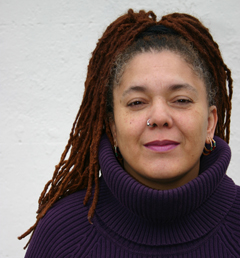|
Intermix.org.uk is a website for the benefit
of mixed-race families, individuals and anyone who feels they have a multiracial
identity and want to join us. Our mission is to offer a view of the mixed-race experience, highlighting icons, film, books, poetry, parenting techniques, celebrities, real lives and much more. Our online forums are a great place to meet others, ask questions, voice your opinions and keep in touch. Sign up for our monthly newsletter and delve into our pages. Want to join in? Become an Intermix member to take part: |
Response To Absent Voices
 Founder's
comments bring criticism and praise.
Founder's
comments bring criticism and praise.
Intermix.org.uk founder Sharron
Hall was asked to respond
to an article in The Guardian by Laura Smith on the mixed-race experience.
Sharron's response produced a large amount of feedback from the public
both praising and criticising her comments.
The response was limited to 550 words and Sharron was unable to say all
that she wanted to regarding the article so for those of you who didn't
get a chance to read it, here is the complete article, followed by a
link to Laura Smith's original article, Sharron's article in The Guardian
and the feedback.
As the founder of the UK's leading website for mixed-race people and
their families, I was a little worried when several members emailed
me about a piece in The Guardian’s society pages.
Every time a negative story appears the scales dip a little more under
the weight of too many issues and not enough celebration. Laura Smith’s
Absent Voices however, highlights some of the important challenges
mixed-race individuals and families have to contend with.
The overrepresentation of mixed-race children in care, "Last
year, mixed children accounted for 8% of looked after children, although
only 3% of under-16s are mixed". These are worrying figures, and
reflect how difficult it can be for these families. Your mixed race
child is a sign you have crossed racial lines and you will constantly
come across those who will seek to punish you because of that. Some
feel it is their right to let you know they disapprove of your choice,
they may do so with varying degrees of violence and can come from any
racial group including your own. This can be too much for some parents
especially if disapproval comes from within their own network of family
and friends.
Parents can also face criticism for not knowing how to care for their
mixed-race children and Laura gives us an example of that when she
says:
"Say you are a mixed-race boy growing up
with your white mother who doesn't know about the culture and your
hair's not plaited and your skin's not creamed. You are going to feel
self-conscious and will probably be teased at school."
That's just what happened to me, it wasn't that my mother didn't care,
she tried to plait my hair but it was just too difficult for her to
manage and her being white had very little to do with it. My Bajan
father also couldn't manage it. There are many parents who need help
especially if their child's hair is not the same as their own and would
welcome helpful suggestions rather than criticism. Being a parent is
not easy but it can be extremely difficult if your child has differences
society does not want to recognise or cater for.
Education is of the utmost importance but at school mixed-race families
face even more ignorance concerning their needs. Laura touched on: "A
report commissioned by the Department for Education and skills in 2004
found that mixed children were ignored by school curricula and by school
and local education authority policies on race." We all need
to see portrayals of ourselves and where we fit into society and for
most children
school is where they get their first glimpses of the world around them
and those that have gone before them. For mixed-race children however
that world and history does not reflect them. Instead it's a world
of high white achievement and history, a little black achievement and
history and nothing about mixed-race history or achievement. So if
both your parents are mixed-race or they are of Scottish, Jamaican,
Chinese and Swiss
heritage, exactly where do you fit in.
I started Intermix.org.uk because I wanted to change society’s
perception of the mixed-race individual and family. The mixed-race
experience is not just a black and white thing; it’s more than
a colour, though that factor will cause the most distress and the least
acceptance. Mixed-race is Jamaican and Japanese, or Scottish, Swedish
and Thai, or even Pakistani, French, Nigerian and Welsh. There are
any number of combinations and
each results in a human being with as much right to be included in
society as anyone else.
With the mixed-race population growing larger by the day, isn't it
time for us to see its unique make-up as an identity in its own right?
Click
here to read Laura Smith's article:
Click here to read Sharron Hall's response and feedback:
Click here to leave your comments on our forums:
View this months news:
Source:
